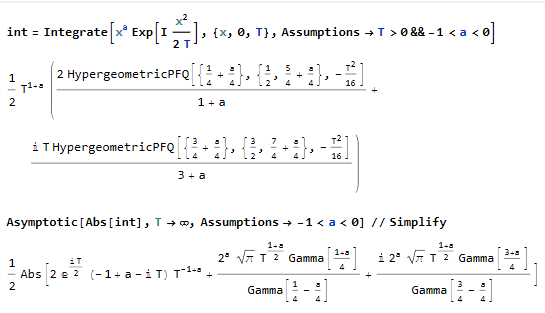Lemma 4.5 of Titchmarsh's book The Theory of the Riemann Zeta function says (slightly rephrased):
Let $F$ be a twice differentiable real function such that $ F''(x) \geq r > 0$ for all $x$ in $[a,b]$ or $ F''(x) \leq -r < 0$ for all $x$ in $[a,b]$. Let $G$ be a real function such that $G(x)/F'(x)$ is monotonic and $|G(x)| \leq M$ for all $x$ in $[a,b]$. Then we have $$ \left| \int_a^b G(x) e^{iF(x)} dx \right| \leq \frac{8M}{\sqrt{r}} .$$
I am considering the case $$ I_\alpha(T) = \left| \int_1^T x^\alpha e^{iF(x)} dx \right| $$ where $ F''(x) \geq 1/T$ and $x^\alpha/F'(x)$ is monotonic for all $x$ in $[1, T]$ and for all $\alpha > -1$.
Titchmarsh's Lemma (for $\alpha > -1/2$) and the trivial bound (for $-1/2 \geq \alpha > -1$) give
$$ I_\alpha(T) \leq \begin{cases} 8T^{\alpha + 1/2} \ &\text{if} \ \alpha \geq 0 \\ 8T^{1/2} \ &\text{if} \ 0 >\alpha > -\frac{1}{2} \\ \frac{T^{\alpha + 1}}{\alpha+1} &\text{if} -\frac{1}{2} \geq \alpha > -1 \end{cases} $$
I am wondering if one can do better (asymptotically in $T$) in the cases when $0 > \alpha > -1$ by combining the oscillatory cancellation from $e^{iF(x)}$ with the decay from $x^{\alpha}$.

